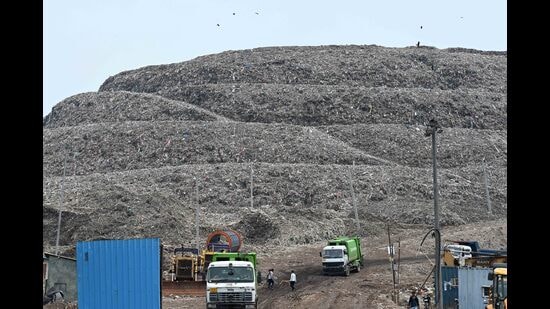Aug 03, 2024 09:30 PM IST
Can our fractured governance systems effectively address the multifaceted waste management issues we face today?
Recently, the Supreme Court (SC) yet again drew attention to Delhi’s waste management crisis, highlighting the daily accumulation of 3,800 tonnes of untreated solid waste. The Court stressed that this violates citizens’ fundamental right to a pollution-free environment, underscoring broader waste management challenges in urban India.

Delhi, like most cities, struggles with waste management. Despite significant discussions and efforts, over 45% of the city’s municipal solid waste continues to be dumped in landfills, leading to environmental degradation and health hazards for residents. The situation is further exacerbated by the existence of legacy waste, accumulated over decades, which poses a monumental challenge for remediation efforts.
Instead of enforcing waste segregation at the source to redirect waste towards recovery, reuse, and recycling, promoting a sustainable approach, and integrating waste-pickers and waste-dealers into the formal waste management system through collaboration between state governments, self-help groups (SHGs), and other relevant players, 2,000 tonnes per day of mixed waste is being incinerated at the waste-to-energy (WTE) plant in Delhi’s Sukhdev Vihar area. This plant faces scrutiny due to its environmental impact and alleged violations of rules, now under SC’s review. Concerns include its location in a densely populated residential zone, disregard for the Delhi Master Plan, 2021, and the absence of a nearby landfill. The plant emits PM2.5 and dioxins, prompting nearby residents to demand its relocation.
Political promises have failed to translate into tangible solutions. While waste management falls under State jurisdiction, the absence of a consolidated approach at the national level exacerbates the problem. The fragmentation of responsibilities across multiple ministries further complicates efforts to tackle the crisis comprehensively.
The Swachh Bharat Abhiyan (Urban), managed by the ministry of housing and urban affairs (MoHUA), aims to create cleaner cities but faces significant challenges due to the fragmented nature of waste management oversight. While MoHUA handles urban sanitation and cleanliness, the guidelines on plastic waste, construction and demolition (C&D) waste, and electronic waste (e-waste), among others, are set by the ministry of environment, forests and climate change. This division of responsibilities results in a lack of cohesive strategy and hampers the efficiency of coordinating waste management practices.
To effectively tackle these challenges, a holistic and integrated approach is crucial. This requires consolidating efforts across various ministries to create a unified framework for waste management. Collaboration with industry stakeholders and local communities is essential to develop innovative solutions and implement best practices. Fostering partnerships for advanced technological solutions is another key aspect. Technologies and standard operating procedures that facilitate efficient waste segregation, recycling, and disposal need to be scaled up and supported by robust policy frameworks. Additionally, state governments should be empowered with the necessary resources and training to manage waste effectively on the ground.
The issue of e-waste, in particular, highlights the urgency of a coordinated approach. Mountains of e-waste, often not covered under the Swachh Bharat Mission, pose significant environmental and health risks. Addressing this requires strategies and regulatory measures currently lacking due to the fragmented governance system.
India’s waste crisis demands concerted effort from all levels of government, private sector players, and civil society. By integrating efforts across ministries, fostering collaborations, and embracing technological advancements, India can move towards a sustainable and circular waste economy.
Can our fractured governance systems effectively address the multifaceted waste management issues we face today? The answer lies in our ability to unify efforts, create a cohesive strategy, and enforce regulations that prioritise both environmental sustainability and public health.
Bhavreen Kandhari is an advocate for environmental rights. The views expressed are personal
Story Saved


